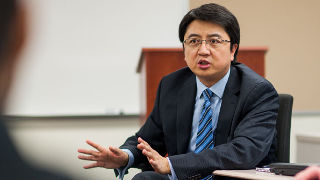Students and Faculty Contribute to Mediation and Conflict Transformation Project for Peace Practitioners with Canadian and Swiss Partners - Seton Hall University
Wednesday, May 12, 2021

Professor David Wood, professor of practice and CPCS fellow, said of the project's objectives, "It is essential that we understand the worldviews of those in conflict if we are to help them achieve sustainable peace. This is because worldviews are the basis for judging what a good society looks like and a good outcome of conflict. If the parties have different measures for defining the 'good', it will be harder for them to resolve differences, identify compromises and forge peace."
Seton Hall students have contributed to this program as research assistants and volunteers. According to Maria T Gonzalez Esquivel, Finance and Administration Coordinator for the CPCS and alumna of the School of Diplomacy, "The opportunities given to research assistants are very valuable because we are able to see theories we have learned in the classroom being applied by practitioners, representing the impact of these theories in the real world. It's the perfect way to connect theory with practice."
This September a final conference in Switzerland will allow for project participants to come together and consolidate lessons learned into key messages. Finally, the project will conclude with the formulation of policy recommendations, a visual animation and a published book outlining lessons learned. The finished products will be provided to various international mediation efforts by international organizations such as the European Union and the United Nations.
The Center for Security Studies emphasizes that this collaborative effort is designed to "identify successful methodologies (and) best practices to promote peaceful transformation of worldview conflicts, and to determine whether these methodologies (and) practices differ from those that have proven successful in interest and identity-based conflicts." Director of the Center for Peace and Conflict Studies, Dr. Zheng Wang, hopes this partnership will "contribute to the theory and practice of mediating conflicts between groups with different worldviews as this is one of the underdeveloped areas of study."
Categories: Nation and World, Research






